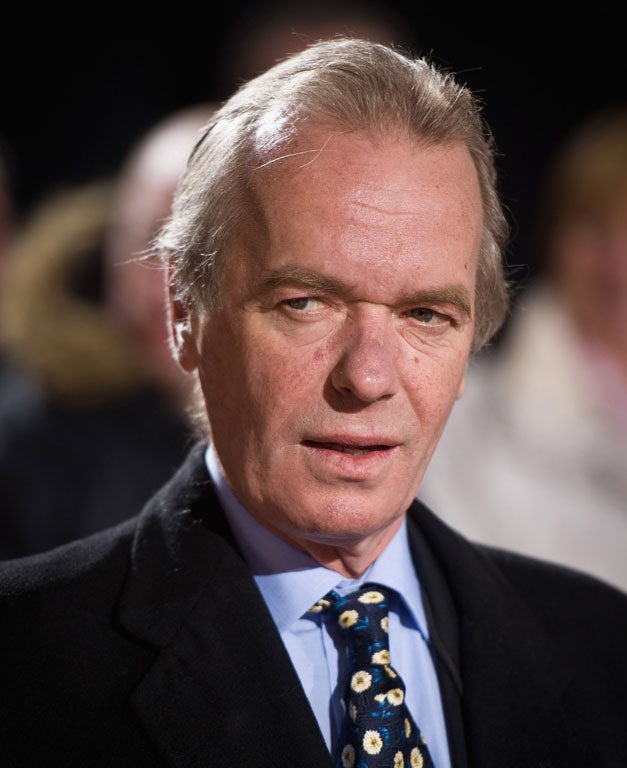Martin Amis: The Biography, By Richard Bradford
Amis Jr was raised amid a hellish, endless cocktail party that helps explain the contradictions of his character and his work

Martin Amis excites many emotions ; anger, laughter, irritation, envy and idolatry being only a few – but the most unexpected one that emerges from this biography is compassion.
Novelists tend to be forged by the experience of anguish, but the "endless cocktail party" in which the three Amis children were brought up would, in a lesser writer, fill a misery memoir. His father, the near-alcoholic Kingsley Amis had, as Richard Bradford puts it, a "limitless taste for adultery" and if his naive young wife Hilly provided their children with love, then the chaos evinced by these pages explains much about his son's fiction. Certainly by the end of this first biography, the old joke about "Mein Kampf by Martin Amis" being the least likely combination of author and title looks a bitter one.
Where Martin's elder brother, Philip, struggling out of an adolescence marked by drugs, truancy and failure, was sneered at by Kingsley for becoming a painter, and his younger sister, Sally, died an alcoholic, Martin survived and triumphed. Bradford, the author of a well received biography of Kingsley, covers this ground confidently. Martin's peripatetic, patchy education, drugs, promiscuity and his father's remarriage to Elizabeth Jane Howard were overcome by natural intelligence and formidable hard work. Within four years of failing his English O-level, he had won a Congratulatory First from Oxford and was writing for the TLS. He published his first novel, The Rachel Papers, at 23, and became a celebrity.
He had also become a notable success with rich, beautiful, well-connected women, conducting affairs with, among others, Tina Brown, Gully Wells, Tamasin Day-Lewis, Emma Soames, Julie Kavanagh, Lorna Sage, Victoria Rothschild, Mary Furness and Angela Gorgas. How did a man who, as a short, fat, neglected teenager, was noted by Richard Eyre as "so unhappy", manage to transform himself into the so-called Mick Jagger of literature to whom women flocked? Amis's life is full of contradictions. Less selfish than Kingsley, cleverer and more sensitive, he is less successful. One of his most interesting early novels, Success, is narrated by two brothers, one short, ugly and totally lacking in confidence, the other handsome, confident and arrogant. It's a duality which is repeated in many other books, most notably The Information, Dead Babies and The Pregnant Widow, and it's one which lies at the heart of his flawed brilliance as a writer of fiction – and his media image.
The affairs became press fodder, but just as crucial are the alliances formed during Amis's time at the TLS and New Statesman, entertainingly described. The Amis-Barnes-McEwan triumvirate was forged in this era, though as important is Amis's friendship with the polemical journalist Christopher Hitchens (much quoted here). Maybe it was this boozy male braggadocio that made Amis think it clever to review soft porn, and research Money by getting a hand job (alongside "Hitch") in a New York brothel. Apparently this helped woo his first wife, Antonia Philips, but readers who wish, in Nabokov's phrase, to "dot every 'I' with the author's head" have had Amis's served to them on a plate. The illegitimate daughter, the fall-out with Julian Barnes, the adultery, the ludicrous provocations over subjects ranging from Islam to children's books have all damaged his reputation – almost as much as the increasingly disappointing novels. Now 62, he is guaranteed column inches, but his first novel remains the only one for which he has ever won a prize. Teenagers still adore it.
Bradford is at his strongest when giving detailed readings of the novels, and allowed to criticise them. "In the novels one encounters a magnificent performance ... but once the performance is over we are left with little but a feeling of admiration for someone who can use language so brilliantly." Amis's journalism and his autobiography Experience, on the other hand, are outstanding because they are not chiefly concerned with this performing aspect. They reveal a humane, thoughtful, observant writer: just as funny but discordant with Amis's fiction.
While McEwan and Barnes have deservedly won the Booker prize, Amis has not. There is a reason why so many admirers of his early novels, especially Money, have given up on him, and it has everything to do with the "virtuoso intolerance" fostered by his father, his education, and, one fears, the protective adulation of his friends and fans. Bradford's assertion in the final chapter that Amis is "the most important British novelist of his generation", puts his biographer firmly into the last camp. Yet Amis could yet become that dazzling blend of Dickens and Nabokov he once promised to be. The struggle is not yet over – though this patchy and compromised biography may well have added to it.
Amanda Craig's novels include A Vicious Circle and Hearts and Minds, published by Abacus
To order any of these books at a reduced price, including free UK p&p, call Independent Books Direct on 0843 0600 030 or visit independentbooksdirect.co.uk
Subscribe to Independent Premium to bookmark this article
Want to bookmark your favourite articles and stories to read or reference later? Start your Independent Premium subscription today.

Join our commenting forum
Join thought-provoking conversations, follow other Independent readers and see their replies